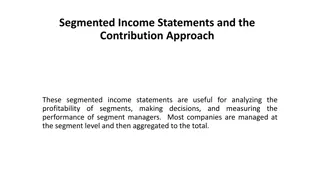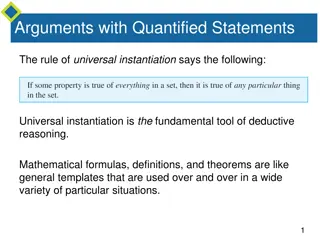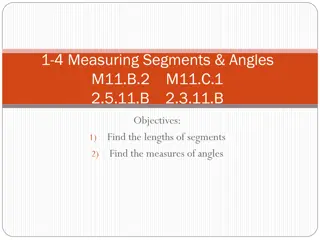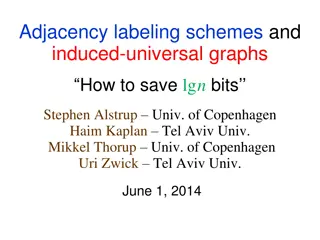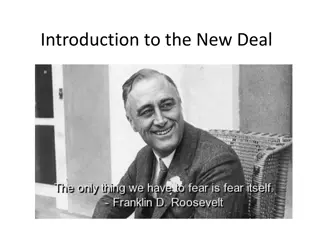Understanding Comcast-NBC Universal Deal and Segment Reporting
Exploring the complex deal structure of Comcast-NBC Universal merger through LLC utilization and non-controlling interest buyout. Analysis includes segment reporting, fair value assessments, and net asset valuation under acquisition accounting, shedding light on the interdependencies across operating segments.
Download Presentation

Please find below an Image/Link to download the presentation.
The content on the website is provided AS IS for your information and personal use only. It may not be sold, licensed, or shared on other websites without obtaining consent from the author. Download presentation by click this link. If you encounter any issues during the download, it is possible that the publisher has removed the file from their server.
E N D
Presentation Transcript
Complex Deals: Class 7 Comcast-NBC Universal Case; segment reporting 1. Comcast-NBC Universal Case Combining assets of two companies Using an LLC in deal design Buyout of non-controlling interests stake 2. Segment Reporting Report disaggregated information by segment Using the Management Approach to identify operating segments Measuring diversification within a firm using segment data Evaluating the extent of interdependencies across operating segments 1 Class 7- Complex Deals
The basic deal structure GE contributes NBCUniversal and Comcast contributes Content Businesses to NBCUniversal Media LLC. Because GE maintains a 49% stake in NBC Universal Holdings, it now indirectly owns 49% of the Comcast Content Businesses. This implies that part of the purchase price that Comcast paid for NBCUniversal is the fair value of the 49% stake of the Comcast Content Businesses GE now owns. 2 Class 7- Complex Deals
Comcast values the 49% of its Content Businesses at fair value as part of the purchase price because GE holds a 49% stake in NBC Universal Holdings and indirectly owns 49% of the Comcast Content Businesses. Comcast gave up 49% of content businesses The net assets of NBCUniversal are valued in the deal under Acquisition Accounting at $24,089 3 Class 7- Complex Deals
In note 4, Comcast tells us that: The Comcast Content Business continues at its historical or carry-over basis. The Comcast Content Business is carried at its carry-over cost post-deal because Comcast controls these business both before and after the deal. That is, assets are only revalued when there is a change in control, and post- deal Comcast retains control. The net assets of NBCUniversal are valued in the deal under Acquisition Accounting at $24,089 4 Class 7- Complex Deals
From the footnotes In note 4, Comcast tells us that: The Comcast Content Business continues at its historical or carry-over basis. The Comcast Content Business is carried at its carry-over cost post-deal because Comcast controls these business both before and after the deal. That is, assets are only revalued when there is a change in control, and post- deal control. 5 Class 7- Complex Deals
Net Assets = A-L = $5,121 - $584 = $4,537 Total Net Assets = $NBCU Net Assets + $Content Net Assets = $24,089 + $4,537 = $28,626 6 Class 7- Complex Deals
7 Class 7- Complex Deals
Because Comcast Content Businesses are reflected at historical cost in the deal, GE s NCI will be based on these historical costs GE s 49% NCI in NBCU = $13,071 $5,121 - $584 - $136 - $57 = $4,344 = total controlled by Comcast & GE jointly $4,344*.49 = $2,128 = GE s NCI 8 Class 7- Complex Deals
GEs 49% NCI in NBCU = $13,071 Because Comcast Content Businesses are reflected at an historical basis in the deal, GE s NCI will be based on these historical costs $5,121 - $584 - $136 - $57 = $4,344 = total controlled by Comcast & GE jointly $4,344*.49 = $2,128 = GE s NCI So, total GE NCI = $13,071 + $2,128 = $15,199 On the date of the deal, NCI recorded at $15,198. The difference is due to rounding. 9 Class 7- Complex Deals
NBCUniversal Holdings is structured as a pass through entity. As a result, it (and its Sub, NBCUniversal Media LLC) pays no entity level taxes. The taxable income from NBC passes directly to the tax returns of Comcast and GE. Comcast thus pays taxes on its 51% share of NBC s taxable income, and GE is taxed on its 49% of the taxable income. => So, Comcast reports NBC s entire net income in its consolidated income statement, but only pays tax on 51%. Most of the $620 represents taxes attributable to GE! 10 Class 7- Complex Deals
This is not a step acquisition as Comcast already controlled NBCU with its 51% stake Because Comcast is basically buying out GE s NCI, the main debit is to NCI. 11 Class 7- Complex Deals
Because Comcast is basically buying out GEs NCI, the main debit is to NCI. NCI Building/Land 17,006 1,400 Cash Senior Debt Commercial paper (cash) Credit facility Preferred Stock APIC (plug) 11,400 4,000 750 1,250 725 281 12 Class 7- Complex Deals
13 Class 7- Complex Deals
The disaggregated pieces of the business 14 Class 7- Complex Deals
15 Class 7- Complex Deals
16 Class 7- Complex Deals
Advertising revenue decreased in 2013 primarily due to $1.2 billion of advertising revenue recorded in 2012 associated with our broadcasts of the 2012 Super Bowl and the 2012 London Olympics. 17 Class 7- Complex Deals
Advertising revenue increased in 2014 primarily due to revenue associated with our broadcast of the 2014 Sochi Olympics. Programming and production costs increased in 2014 primarily due to costs of $715 million associated with our broadcast of the 2014 Sochi Olympics, as well as our continued investment in original programming. 18 Class 7- Complex Deals
How do companies choose which segments to report? Required to report disaggregated information by segment using the Management Approach The objective is to allow users to see the company s business through the eyes of management based upon the way management actually reviews performance and makes decisions. Requires segment information to be reported based on how management internally evaluates the operating performance of the company s business units or segments (i.e., its management reporting structure). Provides users with the opportunity to see the entity from management s vantage point and enhances users ability to predict actions of management that can significantly affect the entity s prospects for future cash flows. 19 Class 7- Complex Deals
Management Approach: Identifying operating segments Identify the public entity s chief operating decision maker (CODM). The term CODM identifies the decision making role within an organization. Often CODM is its chief executive officer or chief operating officer, but it may be a group of executives. CODM is the individual or individuals who evaluate an entity s operating results to assess performance and allocate resources. An operating segment is a component of a business entity in which: Engages in business activities from which it may earn revenues and incur expenses (including start-up operations and revenues and expenses relating to transactions with other components of the same entity). The operating results of the component are regularly reviewed by the entity s CODM to assess the performance of the individual component and make decisions about resources to be allocated to the component. 20 Class 7- Complex Deals
21 Class 7- Complex Deals
Measuring Diversification: Revenue HHI Herfindahl Hirschman Index : Sum of squared market shares: Highly diversified. Rule of thumb: HHI > 2,500 concentrated HHI < 2,500 diversified 4 segments: 25%, 25%, 25%, 25% => 252*4 = HHI = 2,500 82%, 6%, 6%, 6% => 822+62*3= HHI = 6,832 2 2 2 27,564 18,676 42,725 + + + = ... 1,717.3 + + + 148,589 4,038 148,589 4,038 148,589 4,038 22 Class 7- Complex Deals
23 Class 7- Complex Deals
Within firm activity: A measure of interdependencies across business units. 24 Class 7- Complex Deals
From note 15 of the 10Q, NBCUniversal Media LLC as an entity guarantees debt of certain other Comcast entities. In this footnote, Comcast reports NBCU Media (and other entities) using the equity method to show Comcast creditors exactly what the guaranteeing entities consists of. By using the equity method, it strips out the assets and liabilities of NBCU Media s subs, which are non-guarantor entities 25 Class 7- Complex Deals
26 Class 7- Complex Deals
We see from the table below that NBCU Medias only significant assets are its ownership stakes in its subsidiaries of $40,426. Thus, creditors can only look to this stock ownership directly, or indirectly to cash in the underlying subs that NBCU has an ownership claim to. 27 27 Class 7- Complex Deals




